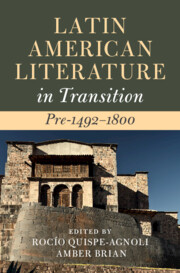Book contents
- Latin American Literature in Transition Pre-1492–1800
- Latin American Literature in Transition
- Latin American Literature in Transition Pre-1492–1800
- Copyright page
- Dedication
- Contents
- Figures
- Contributors
- Acknowledgments
- Introduction Dwelling in Transitions
- Part I Land, Space, Territory
- Chapter 1 Migrations and Foundations in the Literature of New Spain
- Chapter 2 Defining Portuguese America: The First Depictions of Brazil Within the Context of Overseas Expansion
- Chapter 3 The Conquest of Space in the Relación del Descubrimiento del Rio Marañón by Gerónimo de Ypori (c. 1630)
- Chapter 4 Disturbing Place: Afro-Iberian Herbalists Interrupt Imperial Cartagena de Indias
- Part II Body
- Part III Belief Systems
- Part IV Literacies
- Part V Languages
- Part VI Identities
- Index
- References
Chapter 3 - The Conquest of Space in the Relación del Descubrimiento del Rio Marañón by Gerónimo de Ypori (c. 1630)
from Part I - Land, Space, Territory
Published online by Cambridge University Press: 25 November 2022
- Latin American Literature in Transition Pre-1492–1800
- Latin American Literature in Transition
- Latin American Literature in Transition Pre-1492–1800
- Copyright page
- Dedication
- Contents
- Figures
- Contributors
- Acknowledgments
- Introduction Dwelling in Transitions
- Part I Land, Space, Territory
- Chapter 1 Migrations and Foundations in the Literature of New Spain
- Chapter 2 Defining Portuguese America: The First Depictions of Brazil Within the Context of Overseas Expansion
- Chapter 3 The Conquest of Space in the Relación del Descubrimiento del Rio Marañón by Gerónimo de Ypori (c. 1630)
- Chapter 4 Disturbing Place: Afro-Iberian Herbalists Interrupt Imperial Cartagena de Indias
- Part II Body
- Part III Belief Systems
- Part IV Literacies
- Part V Languages
- Part VI Identities
- Index
- References
Summary
This chapter examines Friar Gerónimo de Ypori’s Relacion about the controversial expedition led by Pedro de Ursúa into the Amazon Basin (1560-1561). This expedition led to the rise of the infamous Lope de Aguirre, leader of the Marañones soldiers and explorers. Ypori’s account intended to understand the unknown Amazonian space through description. In doing so, the writer carries out an epistemological exercise to exert sovereignty over a placethat is amorphous in the eyes of his European readers and “uncovers it” for them. Departing from Mary Louise Pratt’s and Edward Said’s discussions about the close connections between writing, cartography, geography, conquest and colonial control, this chapter focuses on the complexity of modes of discourse and ways of writing that were further influenced by the transition of the Spanish legal and bureaucratic writing models into the colonial space of the New World.
Keywords
- Type
- Chapter
- Information
- Latin American Literature in Transition Pre-1492–1800 , pp. 48 - 62Publisher: Cambridge University PressPrint publication year: 2022

